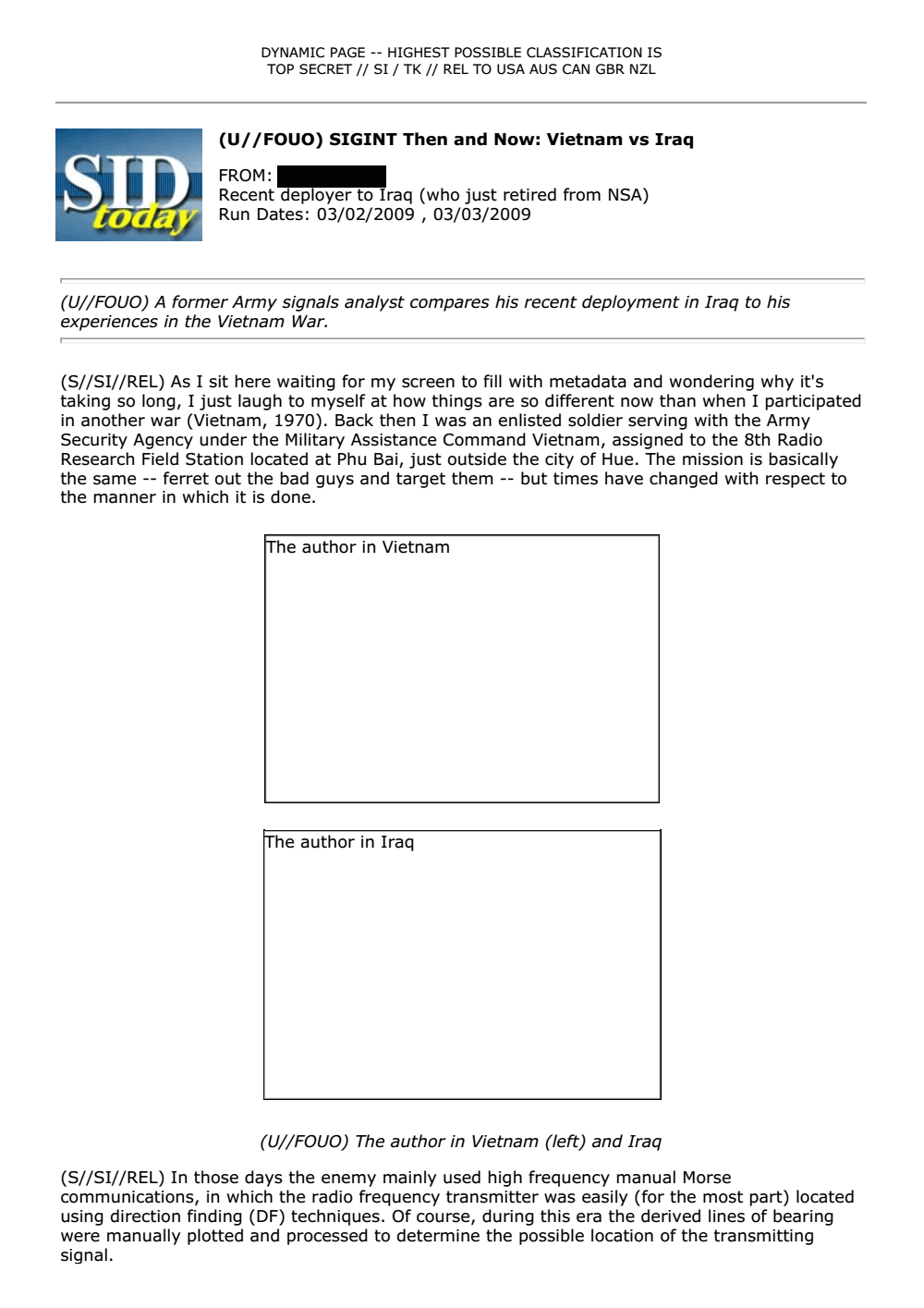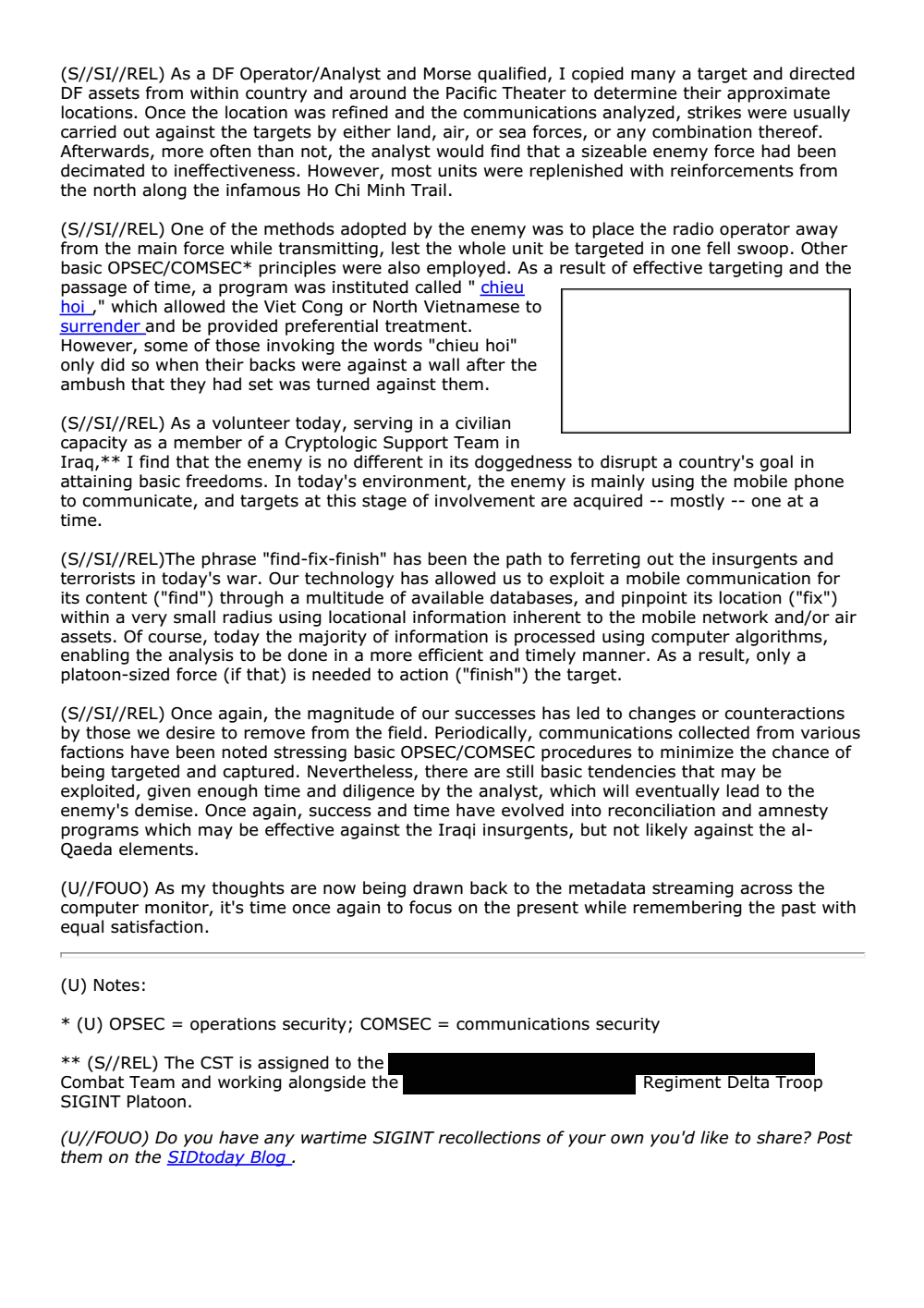
DYNAMIC PAGE -- HIGHEST POSSIBLE CLASSIFICATION IS
TOP SECRET // SI / TK // REL TO USA AUS CAN GBR NZL
(U//FOUO) SIGINT Then and Now: Vietnam vs Iraq
FROM:
Recent deployer to Iraq (who just retired from NSA)
Run Dates: 03/02/2009 , 03/03/2009
(U//FOUO) A former Army signals analyst compares his recent deployment in Iraq to his
experiences in the Vietnam War.
(S//SI//REL) As I sit here waiting for my screen to fill with metadata and wondering why it's
taking so long, I just laugh to myself at how things are so different now than when I participated
in another war (Vietnam, 1970). Back then I was an enlisted soldier serving with the Army
Security Agency under the Military Assistance Command Vietnam, assigned to the 8th Radio
Research Field Station located at Phu Bai, just outside the city of Hue. The mission is basically
the same -- ferret out the bad guys and target them -- but times have changed with respect to
the manner in which it is done.
The author in Vietnam
The author in Iraq
(U//FOUO) The author in Vietnam (left) and Iraq
(S//SI//REL) In those days the enemy mainly used high frequency manual Morse
communications, in which the radio frequency transmitter was easily (for the most part) located
using direction finding (DF) techniques. Of course, during this era the derived lines of bearing
were manually plotted and processed to determine the possible location of the transmitting
signal.

(S//SI//REL) As a DF Operator/Analyst and Morse qualified, I copied many a target and directed
DF assets from within country and around the Pacific Theater to determine their approximate
locations. Once the location was refined and the communications analyzed, strikes were usually
carried out against the targets by either land, air, or sea forces, or any combination thereof.
Afterwards, more often than not, the analyst would find that a sizeable enemy force had been
decimated to ineffectiveness. However, most units were replenished with reinforcements from
the north along the infamous Ho Chi Minh Trail.
(S//SI//REL) One of the methods adopted by the enemy was to place the radio operator away
from the main force while transmitting, lest the whole unit be targeted in one fell swoop. Other
basic OPSEC/COMSEC* principles were also employed. As a result of effective targeting and the
passage of time, a program was instituted called " chieu
hoi ," which allowed the Viet Cong or North Vietnamese to
surrender and be provided preferential treatment.
However, some of those invoking the words "chieu hoi"
only did so when their backs were against a wall after the
ambush that they had set was turned against them.
(S//SI//REL) As a volunteer today, serving in a civilian
capacity as a member of a Cryptologic Support Team in
Iraq,** I find that the enemy is no different in its doggedness to disrupt a country's goal in
attaining basic freedoms. In today's environment, the enemy is mainly using the mobile phone
to communicate, and targets at this stage of involvement are acquired -- mostly -- one at a
time.
(S//SI//REL)The phrase "find-fix-finish" has been the path to ferreting out the insurgents and
terrorists in today's war. Our technology has allowed us to exploit a mobile communication for
its content ("find") through a multitude of available databases, and pinpoint its location ("fix")
within a very small radius using locational information inherent to the mobile network and/or air
assets. Of course, today the majority of information is processed using computer algorithms,
enabling the analysis to be done in a more efficient and timely manner. As a result, only a
platoon-sized force (if that) is needed to action ("finish") the target.
(S//SI//REL) Once again, the magnitude of our successes has led to changes or counteractions
by those we desire to remove from the field. Periodically, communications collected from various
factions have been noted stressing basic OPSEC/COMSEC procedures to minimize the chance of
being targeted and captured. Nevertheless, there are still basic tendencies that may be
exploited, given enough time and diligence by the analyst, which will eventually lead to the
enemy's demise. Once again, success and time have evolved into reconciliation and amnesty
programs which may be effective against the Iraqi insurgents, but not likely against the alQaeda elements.
(U//FOUO) As my thoughts are now being drawn back to the metadata streaming across the
computer monitor, it's time once again to focus on the present while remembering the past with
equal satisfaction.
(U) Notes:
* (U) OPSEC = operations security; COMSEC = communications security
** (S//REL) The CST is assigned to the
Combat Team and working alongside the
SIGINT Platoon.
Regiment Delta Troop
(U//FOUO) Do you have any wartime SIGINT recollections of your own you'd like to share? Post
them on the SIDtoday Blog .

"(U//FOUO) SIDtoday articles may not be republished or reposted outside NSANet
without the consent of S0121 (DL sid_comms)."
DYNAMIC PAGE -- HIGHEST POSSIBLE CLASSIFICATION IS
TOP SECRET // SI / TK // REL TO USA AUS CAN GBR NZL
DERIVED FROM: NSA/CSSM 1-52, DATED 08 JAN 2007 DECLASSIFY ON: 20320108